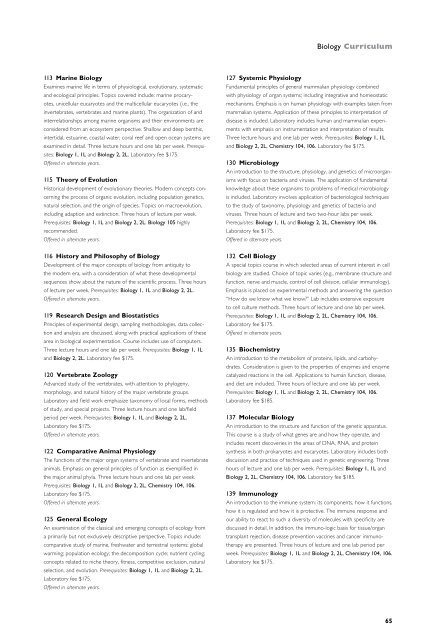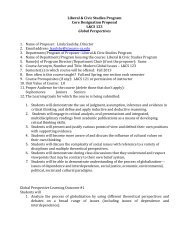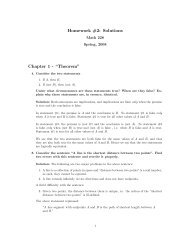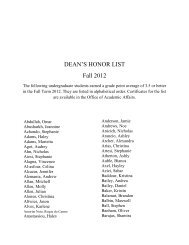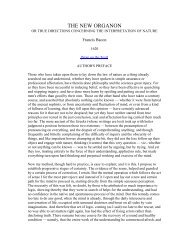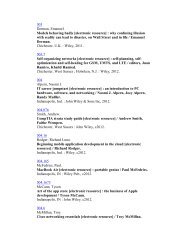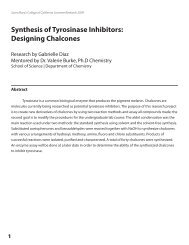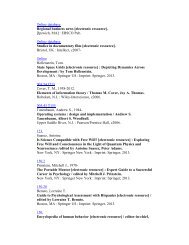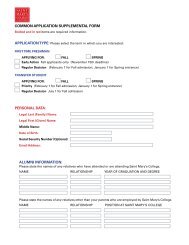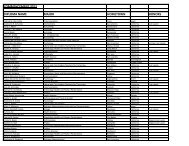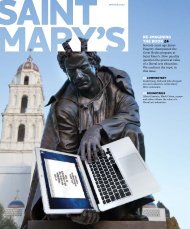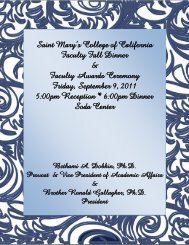2008-09 Catalog - Saint Mary's College of California
2008-09 Catalog - Saint Mary's College of California
2008-09 Catalog - Saint Mary's College of California
Create successful ePaper yourself
Turn your PDF publications into a flip-book with our unique Google optimized e-Paper software.
Biology Curriculum113 Marine BiologyExamines marine life in terms <strong>of</strong> physiological, evolutionary, systematicand ecological principles. Topics covered include: marine procaryotes,unicellular eucaryotes and the multicellular eucaryotes (i.e., theinvertebrates, vertebrates and marine plants). The organization <strong>of</strong> andinterrelationships among marine organisms and their environments areconsidered from an ecosystem perspective. Shallow and deep benthic,intertidal, estuarine, coastal water, coral reef and open ocean systems areexamined in detail. Three lecture hours and one lab per week. Prerequisites:Biology 1, 1L and Biology 2, 2L. Laboratory fee $175.Offered in alternate years.115 Theory <strong>of</strong> EvolutionHistorical development <strong>of</strong> evolutionary theories. Modern concepts concerningthe process <strong>of</strong> organic evolution, including population genetics,natural selection, and the origin <strong>of</strong> species. Topics on macroevolution,including adaption and extinction. Three hours <strong>of</strong> lecture per week.Prerequisites: Biology 1, 1L and Biology 2, 2L. Biology 105 highlyrecommended.Offered in alternate years.116 History and Philosophy <strong>of</strong> BiologyDevelopment <strong>of</strong> the major concepts <strong>of</strong> biology from antiquity tothe modern era, with a consideration <strong>of</strong> what these developmentalsequences show about the nature <strong>of</strong> the scientific process. Three hours<strong>of</strong> lecture per week. Prerequisites: Biology 1, 1L and Biology 2, 2L.Offered in alternate years.119 Research Design and BiostatisticsPrinciples <strong>of</strong> experimental design, sampling methodologies, data collectionand analysis are discussed, along with practical applications <strong>of</strong> thesearea in biological experimentation. Course includes use <strong>of</strong> computers.Three lecture hours and one lab per week. Prerequisites: Biology 1, 1Land Biology 2, 2L. Laboratory fee $175.120 Vertebrate ZoologyAdvanced study <strong>of</strong> the vertebrates, with attention to phylogeny,morphology, and natural history <strong>of</strong> the major vertebrate groups.Laboratory and field work emphasize taxonomy <strong>of</strong> local forms, methods<strong>of</strong> study, and special projects. Three lecture hours and one lab/fieldperiod per week. Prerequisites: Biology 1, 1L and Biology 2, 2L.Laboratory fee $175.Offered in alternate years.122 Comparative Animal PhysiologyThe functions <strong>of</strong> the major organ systems <strong>of</strong> vertebrate and invertebrateanimals. Emphasis on general principles <strong>of</strong> function as exemplified inthe major animal phyla. Three lecture hours and one lab per week.Prerequisites: Biology 1, 1L and Biology 2, 2L, Chemistry 104, 106.Laboratory fee $175.Offered in alternate years.125 General EcologyAn examination <strong>of</strong> the classical and emerging concepts <strong>of</strong> ecology froma primarily but not exclusively descriptive perspective. Topics include:comparative study <strong>of</strong> marine, freshwater and terrestrial systems; globalwarming; population ecology; the decomposition cycle; nutrient cycling;concepts related to niche theory, fitness, competitive exclusion, naturalselection, and evolution. Prerequisites: Biology 1, 1L and Biology 2, 2L.Laboratory fee $175.Offered in alternate years.127 Systemic PhysiologyFundamental principles <strong>of</strong> general mammalian physiology combinedwith physiology <strong>of</strong> organ systems; including integrative and homeostaticmechanisms. Emphasis is on human physiology with examples taken frommammalian systems. Application <strong>of</strong> these principles to interpretation <strong>of</strong>disease is included. Laboratory includes human and mammalian experimentswith emphasis on instrumentation and interpretation <strong>of</strong> results.Three lecture hours and one lab per week. Prerequisites: Biology 1, 1Land Biology 2, 2L, Chemistry 104, 106. Laboratory fee $175.130 MicrobiologyAn introduction to the structure, physiology, and genetics <strong>of</strong> microorganismswith focus on bacteria and viruses. The application <strong>of</strong> fundamentalknowledge about these organisms to problems <strong>of</strong> medical microbiologyis included. Laboratory involves application <strong>of</strong> bacteriological techniquesto the study <strong>of</strong> taxonomy, physiology and genetics <strong>of</strong> bacteria andviruses. Three hours <strong>of</strong> lecture and two two-hour labs per week.Prerequisites: Biology 1, 1L and Biology 2, 2L, Chemistry 104, 106.Laboratory fee $175.Offered in alternate years.132 Cell BiologyA special topics course in which selected areas <strong>of</strong> current interest in cellbiology are studied. Choice <strong>of</strong> topic varies (e.g., membrane structure andfunction, nerve and muscle, control <strong>of</strong> cell division, cellular immunology).Emphasis is placed on experimental methods and answering the question“How do we know what we know?” Lab includes extensive exposureto cell culture methods. Three hours <strong>of</strong> lecture and one lab per week.Prerequisites: Biology 1, 1L and Biology 2, 2L, Chemistry 104, 106.Laboratory fee $175.Offered in alternate years.135 BiochemistryAn introduction to the metabolism <strong>of</strong> proteins, lipids, and carbohydrates.Consideration is given to the properties <strong>of</strong> enzymes and enzymecatalyzed reactions in the cell. Applications to human function, disease,and diet are included. Three hours <strong>of</strong> lecture and one lab per week.Prerequisites: Biology 1, 1L and Biology 2, 2L, Chemistry 104, 106.Laboratory fee $185.137 Molecular BiologyAn introduction to the structure and function <strong>of</strong> the genetic apparatus.This course is a study <strong>of</strong> what genes are and how they operate, andincludes recent discoveries in the areas <strong>of</strong> DNA, RNA, and proteinsynthesis in both prokaryotes and eucaryotes. Laboratory includes bothdiscussion and practice <strong>of</strong> techniques used in genetic engineering. Threehours <strong>of</strong> lecture and one lab per week. Prerequisites: Biology 1, 1L andBiology 2, 2L, Chemistry 104, 106. Laboratory fee $185.139 ImmunologyAn introduction to the immune system: its components, how it functions,how it is regulated and how it is protective. The immune response andour ability to react to such a diversity <strong>of</strong> molecules with specificity arediscussed in detail. In addition, the immuno-logic basis for tissue/organtransplant rejection, disease prevention vaccines and cancer immunotherapyare presented. Three hours <strong>of</strong> lecture and one lab period perweek. Prerequisites: Biology 1, 1L and Biology 2, 2L, Chemistry 104, 106.Laboratory fee $175.65


